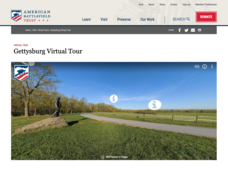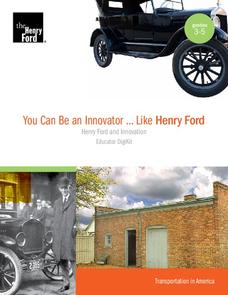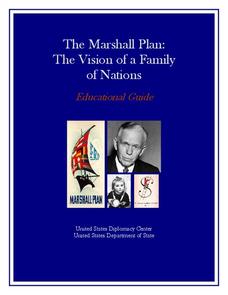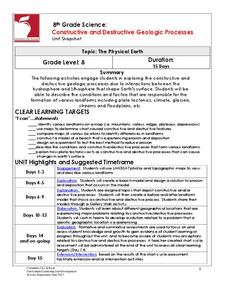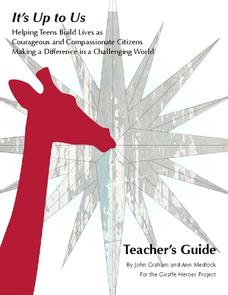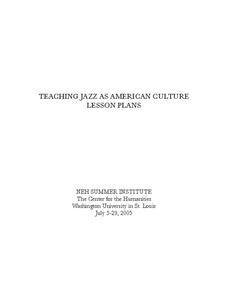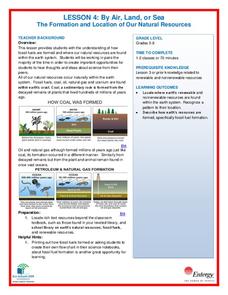American Battlefield Trust
Gettysburg Virtual Tour
Step into one of the most iconic battlefields of the American Civil War with an educational interactive resource. Young historians learn about key moments, locations, soldiers, and turning points in the battle with a clickable map and...
NOAA
Fishy Deep-sea Designs!
Oceans represent more than 80 percent of all habitats, yet we know less about them than most other habitats on the planet. The instructor introduces the epipelagic, mesopelagic, bathypelagic, twilight, and midnight zones in the ocean....
George W. Bush Presidential Library and Museum
Teaching Primary and Secondary Sources
What makes a source primary or secondary? Middle schoolers read a definition of each term before exploring different examples and applying their knowledge to a research project.
Henry Ford Museum
You Can Be an Innovator ... Like Henry Ford
Why did Henry Ford want to invent a car for the masses? Why did Henry Ford locate his factory in Detroit? Why did Henry Ford encourage the idea of a 5-day work week? Young innovators find the answers to these and other question in a unit...
American Physiological Society
Why is Kettle Corn Cooked in Copper Pots?
The kitchen — it's not just for eating anymore! Specific heat is often a difficult concept to grasp, so give it context by relating it to cooking. Learners gain experience in the principles of thermal energy transfer by designing an...
American Physiological Society
How Does the Density of a Liquid Affect the Buoyancy of an Object?
Here's a lesson plan that will really float your boat! Introduce physical science scholars to the relationship between buoyancy and density through an assortment of individual and collaborative exercises. Lab groups work together to...
US Department of State
The Marshall Plan: The Vision of a Family of Nations
The European Recovery Act (aka the Marshall Plan) was designed to bring together and develop a spirit of cooperation among European nations after World War II. Class members examine the materials from the Marshall Plan exhibit and assess...
NOAA
What Killed the Seeds?
Can a coral cure cancer? Take seventh and eighth grade science sleuths to the underwater drugstore for an investigation into emerging pharmaceutical research. The fifth installment in a series of six has classmates research the wealth of...
NOAA
Oceans of Energy
Are the earth's oceans really just giant batteries, waiting for their energy to be harnessed? Middle school mechanical engineers will be shocked by the amazing amount of energy that forms around them after diving into part four of a...
NOAA
Where Have All the Glaciers Gone?
What happens when ice melts? Well ... water happens. When that melting ice is a glacier, the amount of water that results produces change throughout the world. Middle school science sleuths uncover the truth about global warming, the...
Columbus City Schools
Constructive and Destructive Geologic Processes
Show the class the world as they've never seen it before—from way above! Learners try to unravel the mysteries presented by rich satellite imagery, learn to interpret topographic maps, and study erosion by constructing their very own...
John F. Kennedy Presidential Library & Museum
Red States/Blue States: Mapping the Presidential Election
Young historians investigate how voting patterns have changed by comparing the outcome of the 1960 election to the outcome of the recent election. A creative final assessment has participants making a news show wherein they provide...
Alabama Department of Archives and History
Clotilde, The Last Slave Ship
The Clotilde was the last known ship to bring slaves from Africa to the United States - good riddance! Dive into the details of the ship, its cargo, origin, and route, and learn about the future of the Africans on board with a...
Learning to Give
Why Volunteer?
Inspire scholars to volunteer their time to make a positive change in their community. With help from research, a public speaker, and reflection, learners define and asses what it takes to be a volunteer in a business, non-profit,...
Giraffe Heroes Project
It’s Up to Us
The Giraffe Heroes Program is designed for teens willing to stick their necks out to make a difference, and to create community service projects that tackle real world problems. The resource guides teens to choose an issue, design a...
Advocates for Human Rights
The Right to a Clean Environment in the United States
Even if a school has gone digital, chances are there's still plenty of paper being used. The three activities help scholars learn about the environmental impact of paper and another consumer products of their choosing, the issue of...
Carolina K-12
The Results are In! Examining Our First Vote Election
The 2016 election is over, and now it's time to dig in to some data! An activity revolves around data gathered from the First Vote Project in North Carolina wherein thousands of students voted. After diving in to the data using provided...
Carolina K-12
Choice, Conflict, and Compromise at the County level
With all the hubbub surrounding national elections, it's easy to forget the importance of local government. After learning about county governance and voter turnout for local elections, young citizens demonstrate how local governance...
Washington University in St. Louis
Teaching Jazz as American Culture
Jazz and the City, Jazz and the Civil Rights Movement, Jazz and Gender, Jazz and Literature, Jazz and the Arts, Jazz and Film. Here's a packet of unit plans organized around themes that reflect American culture. Each unit examines how...
National Wildlife Federation
Master P in the House: An All School Energy and Climate Change Plan
A person in the US uses 20 times more energy than a person in India—that's a drastic difference! The final lesson in the 12-part series goes back to the initial energy audits, analyzes which room showed the most conservation of energy,...
National Wildlife Federation
Yesterday: Our Energy Needs Over Time
How has our relationship to energy changed over time? An engaging exploration challenges learners to create a timeline showing human energy needs and uses over time. Scholars review what timelines are, choose a 50-year period in history...
National Wildlife Federation
It's All in the Name: Weather Versus Climate
What goes up when rain comes down? An umbrella! Activity eight in the series of 12 explores weather and climate. In pairs, participants analyze maps, watch a short video, create a weather forecast, and complete a reading to determine the...
National Wildlife Federation
By Air, Land, or Sea: The Formation and Location of Our Natural Resources
Coal forms from the ancient remains of plants that were alive on Earth before the dinosaurs! Scholars use their t-charts from the previous lesson over resources and research to determine if their information is correct. Through analysis...
Chicago Botanic Garden
Recent Weather Patterns
Decide whether weather is changing! A two-part activity first challenges classes to review the differences between weather and climate. Once finished, individuals then analyze historical data to determine if climate change is happening...


